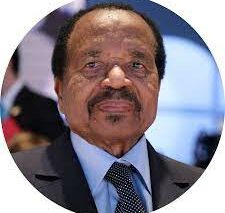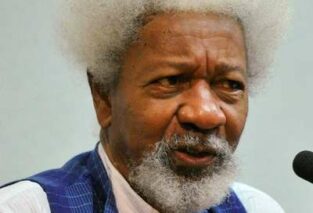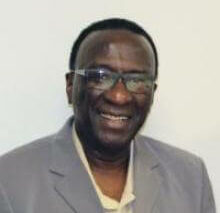(Revised and reproduced from Cameroon Life Magazine Vol III, No 6, July 1992).

Decades before the Biya government declared war on the two English-speaking regions of Cameroon — the Northwest and the Southwest Regions — Cameroonian economist, Celestin Monga, had warned, in an interview to Cameroon Life Magazine (vol. III, No 6, July 1992) that the so-called “Anglophone Problem” in Cameroon could become “the challenge of the decade”, if nothing was done to address the issues at stake. He was right.
Mr. Monga, many Anglophones, and I’d imagine a good number of Francophones too, came to know you mainly through that famous Monga-Njawe trial in which you were accused of the crime of lese-majesté, that is, insulting the Head of State, the National Assembly and the Judiciary. Someone mentioned that the Social Democratic Front (SDF) Chairman, Ni Fru Ndi, unexpectedly showed up at your trial in Douala, elbowed his way to the front to see the man who had so greatly shaken the whole country, and that when he saw you he was shocked that the fuss was only around a child.
That couldn’t be true at all because it was not the first time I was meeting Mr. Fru Ndi. I had met him before at the end of 1990. My wife is from Bamenda; she was born there and her parents have lived there for one or two generations. I was in Bamenda in late 1990 with my wife and we went to his house to greet him. He served us a very sumptuous breakfast.
Was that before your trial?
Yes, it was. Maybe since he received so many people he still could not remember me. I went to greet him and to tell him how impressed I was by what he had done for this country.
What were your first impressions of him?
I found him to be a very dynamic and courageous man. He left a profound impact on me.
Now, let’s talk about your recent triumphal return from Europe after your interview with Messi Messi. Someone who was at the airport and who saw you alight from the plane and was enveloped by the boisterous crowd likened your return to Mandela’s return from prison in South Africa. Did you for one moment think of yourself as the Nelson Mandela of Cameroon?
(Burst of laughter) That was a joke! No, no, not at all. Let me tell you that I wasn’t even aware that there would be people at the airport to wait for me. Coming back home was a very difficult decision to take. Many friends of mine here in Cameroon called me in Paris and cautioned me against coming back home. They said it was too dangerous, that I’d been earmarked for elimination. But I had no intention of spending my life in exile. The day before my return, which was a Friday, I called a press conference and told journalists I was going back home. My aim was simply that if I was arrested at the airport, at least a few people would be in the know. So I boarded the plane the next day and was very pleasantly surprised to see many people waiting for me at the airport. At first, I didn’t know what was happening. But then I was told all those people were there for me. I was led to the lounge where Mr. Fru Ndi and other political leaders of the opposition were waiting. I greeted them and expressed my joy at seeing them waiting for me.
Now let me get your views on an issue of great concern to many Anglophones in this country today. Many Anglophones, especially the intellectuals, feel that Anglophones are marginalised and treated as second class citizens in this country, if not worse. Do you, as a Francophone intellectual, believe there is an Anglophone problem in this country?
I’m not a Francophone “intellectual”. We’re here speaking English. I’m simply a Cameroonian! Of course, there is an Anglophone problem in Cameroon. But let me say that there is also a Kirdi problem in the North, a Pygmy problem in the East, those are some of the forgotten people of our country.
So, to you the Anglophone problem is just one among many problems we’re facing in this country today?
No, it is one of the major problems. A linguistic problem is always much more difficult and dangerous to resolve than, say, a tribal problem. The history of the world bears testimony to that fact. The Anglophone problem in this country is one of the main challenges of the next decade. I feel that if we don’t find the right solution to it, and quickly too, it could turn out to be more explosive than all the other problems we have in our hands.
And just what type of solution do you have in mind?
I think we should recognize that we failed to build a nation-state on the basis of what French political thinkers call “le modèle Jacobin”. Now, we have to recognise the structures of this nation. I’m thinking here mainly of a good decentralisation policy that will give more power and autonomy to the periphery relative to the centre; or, why not, a sort of federalism. Let me, however, hasten to add that when you talk of federalism, you need to explain very clearly what it means. I meet a lot of people who believe that federalism is a panacea to all our problems in this country. That may be so, but the first thing to do is to sell that idea to the majority of our citizens. You cannot just impose it on them without first of all explaining to them what problems it will solve and how it will solve them. That is why I feel that the idea of decentralisation, call it federalism, is not bad but it is a concept that needs to be explained to many Cameroonians who don’t know what it entails. For example, you’ll have to explain to the people what the relationship among the different states or provinces, or whatever entity you choose to call them, would be; then what link the states or provinces would have with the central administration; how you would allocate taxes; how would you define the federal budget; what about such common projects as road construction and maintenance, etc. You have to be precise in your definition of these problems. Such problems notwithstanding, I believe a well thought-out federal or decentralised system could go a long way to help resolve many of the major problems we are facing today, and the Anglophone problem is certainly the major and more pressing one.
You’re no doubt aware of the depth of feeling on this issue in Anglophone circles today, especially among intellectuals.
Yes, but I believe that the majority of Cameroonians, even Anglophone Cameroonians, do not have a clear idea of what the issue really is. That’s why I’m saying that we should first of all educate our people about it, then and only then can they listen and appreciate the solutions we may propose to them. The controversy, I believe, comes from the fact that people these days easily equate federalism to secession, or to an issue that would pit Anglophones against Francophones. To me, federalism should not only be seen in terms of Anglophones and Francophones, it should be between four or five states or provinces.
There’s also the issue of tribalism which should not be overlooked.
That’s true. Some Anglophone journalists have, unfortunately, fallen into the tribalism trap that Mr. Biya has set for them. By attacking the Betis as a community, they oblige the latter to support a regime that has done nothing for them either. Those who’ve pillaged this country are from all ethnic groups, including Anglophone ethnic groups. Those who suffer are from all regions of the country. What difference is there between a cocoa farmer from Sangmelima, a coffee farmer from Bamenda and a cotton farmer from Maroua? The Betis, as a group, have reaped no particular benefit from the Biya regime! Twenty kilometres outside Yaoundé and you have no tarred road, no school, no dispensary. The money stolen from our treasury does not serve to finance public investment in the southern part of the country; it is stolen and stashed away in Swiss bank accounts. In fact, Mr. Biya is not a Beti, he is a Swiss speculator.
Now, let’s talk some more about the Anglophone leadership. How familiar are you with the old Anglophone leaders and do you maintain any links with the new breed of Anglophones leaders?
Yes, it’s easier for me to talk about the new leadership under Ni John Fru Ndi, Ben Muna, Siga Asanga and the host of intellectuals abroad, than about the older generation. At 32 years of age, I’m not really familiar with the likes of Dr. John Ngu Foncha, Tandeng Muna and the rest, but I don’t hold them in high esteem at all. To me, they are all Ahidjo-men and Biya-men. They aren’t any different from their counterparts in this part of the country. I believe that the Anglophone problem is the legacy of the policies of the likes of Foncha and Muna.



